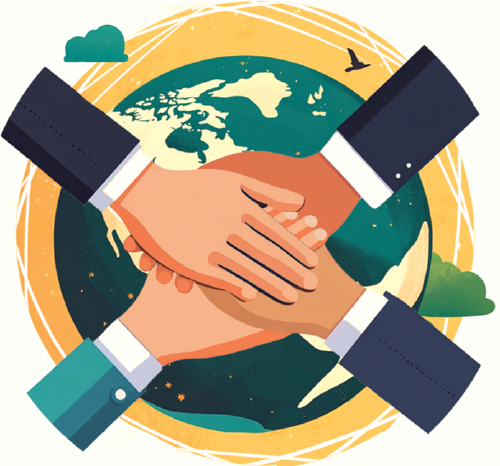Global South: 'non-West' but not 'anti-West'


Western media have increasingly perceived the Global South through the lens of great power competition, shifting their description of it from “non-West” to “anti-West”, and calling for more precautions. The Global South begs to differ.
The Global South is no doubt non-West. Countries in the Global South have come closer to each other because of similar historical experiences, development stages, and political pursuit, all of which contribute to the forming of a shared identity. Such an identity sets them apart from the Global North, most of which are Western developed countries.
The collective rise of Global South countries have given them an increasingly prominent role to play on the international stage, and made their calls for a more just and reasonable global system louder. This, in turn, has further highlighted their “non-West” character.
But “non-West” does not mean “anti-West”. Some Western countries have been busy forming exclusive circles and viewed those who refuse to join as hostile. This is a narrow-minded mentality that the Global South firmly rejects. The endeavor of the Global South to pursue stronger cooperation among themselves is not to build blocs, but rather to promote a new non-aligned movement with a sense of pragmatism. They will not take sides between major countries. What they want is peace, development, and fairness, not war, poverty, or hegemony, still less confrontation with the West.
What exists between the Global North and the Global South is not antagonism in the western sense, but inequality. The current global governance system, dominated by the West, is rife with institutional injustice and defects.
The Global South has contributed up to 80 percent of world economic growth over the past 20 years and its share of global GDP has increased from 24 percent to over 40 percent in the past four decades. Despite this significant progress, the Global South is still a minor player on the international stage with institutional rights that are incommensurate with its contribution. Such inequality is the leading cause of many intractable global issues, in such areas as development and security.
The Global South no longer wants to be the “silent majority”; it aims to take concrete steps to safeguard world peace, development, and fairness. While the West is obsessed with major country rivalry and geopolitical competition, the Global South focuses on addressing severe and complex global challenges, including climate, energy, food, and debt crises.
The West lacks both the ability and the will to provide global public goods, and refuses to share power with the Global South, giving rise to the many imbalances in the global governance system. This makes Global South countries realize that to address global challenges and advance global governance reform, they shouldn’t pin their hopes on a few major countries. What’s needed is the concerted efforts of all countries from both the Global South and the Global North. To this end, South-South cooperation and North-South dialogue are essential. The Global South is striving to bridge differences, not widen divides.
Take the climate crisis as an example. The recently concluded 29th Conference of the Parties to the UN Framework Convention on Climate Change highlighted that climate change poses existential threats to some Global South countries. Western developed countries, however, are not doing enough to implement emission reduction policies or meet their climate finance promises. Instead, they have earmarked massive subsidies for fossil fuels, leading to a significant increase of global fossil fuel subsidies to $1 trillion in 2022.
Global South countries, though strongly condemning such practice, haven’t taken any anti-West stance. They still seek to work with the West to find solutions. A new climate finance target was eventually adopted at the conference, calling for developed countries to raise at least $300 billion annually by 2035 to support developing countries’ climate actions. Although this figure falls far short of Global South countries’ expectations, it is still 20 percent higher than the previous $250 billion target proposed by developed countries, marking a hard-won step forward in North-South cooperation.
This is just one of the many examples that demonstrate Global South countries have never viewed the West as an enemy but always seek closer cooperation with them. Western countries should refrain from misinterpreting efforts made by the Global South, shed small-bloc mentality and ideological prejudice, and actively respond to the call of the Global South.


































